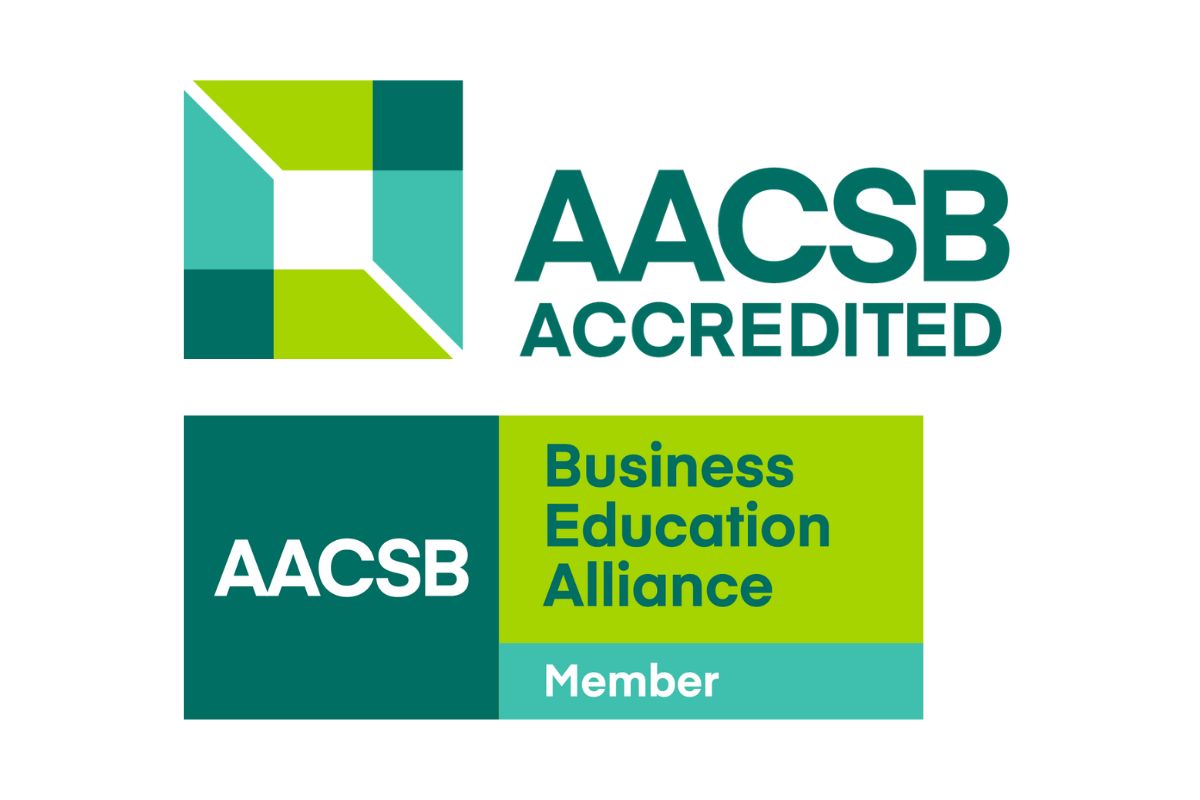
Huddersfield Business School
Business Economics BSc(Hons)
Start Dates
21 September 2026
Duration
4 years inc. placement year. Offered as a 4 year degree only, exception if you f
UCAS Tariff
120-112
Overview
Why choose Huddersfield for this course?
- Study at an AACSB-accredited school — a mark of global excellence held by fewer than 6% worldwide.
- Take an optional 48-week placement in the UK or abroad to apply your skills in industry.
- Economics at Huddersfield is #1 in Yorkshire for teaching, feedback and student voice (NSS 2024).
Accreditation and Professional Links
Recognised connections to give you an extra edge when you graduate. Read More
Graduates with a strong understanding of economics are currently in-demand in the global business industry. Make your mark in this sector, thanks to this Business Economics BSc(Hons) degree, which offers top-class teaching, the chance to gain industry experience, and a range of exciting modules.
This course aims to equip you with the integral skills in and knowledge of business operations and economics. You’ll be able to look at how economic issues are relevant in a business context, as well as learn how business managers make decisions after considering economic policies and other key financial issues, such as inflation. You’ll also learn in our state-of-the-art trading room.
Why study Business Economics BSc(Hons)
You’ll be studying at an AACSB International accredited Business School. Globally, fewer than six per cent of institutions offering business degrees achieve this accreditation. You can also look forward to a high-quality education here, as your teachers rank in the top three in England for the proportion who hold doctorates (HESA 2022). In the National Student Survey 2025, Economics ranked top in Yorkshire for student voice, learning resources and learning opportunities.
On top of option modules, you’ll study a wide range of subjects including:
- Microeconomics and macroeconomics
- International economics
- Industrial economics
- Decision science
Away from campus, you’ll gain relevant real-world experience. After the second year of the course, you’ll put your knowledge and skills to the test in an optional 48-week work placement in your area of interest, in the UK or abroad, utilising our links with local, national, and international companies throughout many industries.
This course will prepare you for a variety of potentially exciting careers in a range of fields in the industry. You could work as a finance officer, audit associate or financial analyst. You’ll be able to work for other organisations, or even pursue your passions by creating your own business. The top five job titles advertised in the UK for graduate roles associated with Business Economics BSc(Hons) are Business Analysts, Data Analysts, Paraplanners, Finance Analysts and Financial Advisors.**
*(All modes, all levels, taught, using Yorkshire £100m+ , limited to rank = 1 and more than 3 institutions)
**Lightcast data extracted from Graduate Career Explorer – job postings from Dec 2023 to Nov 2024 showing jobs advertised associated with a selection of relevant graduate.
Career opportunities after the course *
Business Analysts
Paraplanners
Data Analysts
Finance Analysts
Financial Advisors
*Lightcast
Entry Requirements
BBB-BBC at A Level
DDM-DMM in BTEC Level 3 Extended Diploma
120-112 UCAS points from a combination of Level 3 qualifications
Access to Higher Education Diploma with 45 Level 3 credits at Merit or above
Merit at T Level
120-112 UCAS tariff points from International Baccalaureate qualifications.
In addition you must have GCSE Maths at grade 5 or above, or grade B or above if awarded under the previous GCSE grading scheme.
If your first language is not English, you will need to meet the minimum requirements of an English Language qualification. The minimum for IELTS is 6.0 overall with no element lower than 5.5, or equivalent. Read more about the University’s entry requirements for students outside of the UK on our International Entry Requirements page.
Other suitable experience or qualifications will be considered. For further information please see the University's minimum entry requirements.
Course Details
Choose one from a list which may include:
For more information on when and how we update our modules please see the ‘Legal Information’ section below.
The course offers a one-year (48 weeks) work placement after the second year, in the UK or abroad.
Choose one from a list which may include:
For more information on when and how we update our modules please see the ‘Legal Information’ section below.
Teaching and Assessment
Discover what to expect from your tutor contact time, assessment methods, and feedback process.
Global Professional Award
At Huddersfield, you’ll study the award-winning Global Professional Award (GPA) alongside your degree* — so you’re ready for the career you want, whatever subject you choose.
Placements
The course offers an optional one-year (48 weeks) work placement after the second year, in the UK or abroad.
Our Placement Office works with national and international employers to ensure excellent work experience opportunities are available to you on placement courses as well as giving advice in areas such as interview skills and preparing CVs and covering letters.
Previous placement providers have included Bewley's Tea and Coffee UK (The Roastery), CLS (Conveyancing Liability Solutions), Cummins Turbo Technologies, Freemans Grattan Holdings (FGH), Government Economic Service, Hellmann Worldwide Logistics, Kiddies Kingdom, Kirklees Council Transport Services, LiFE Residential, Lloyds Banking Group, NHS England, PwC and Thornton and Ross.
The placement year is a valuable tool that can enhance your employability and help you to develop as an individual. It is acknowledged that graduates with industry experience are generally much more attractive to employers.
I chose to do a placement as I knew the job market is tough, and I wanted to make sure I had some extra experience that will put me ahead in the job market. This placement has given me a clearer perspective on what I enjoy and where my key strengths are so I can pursue them further
- Omar Kaf Al-Ghazal
Placement Student, Enterprise Rent-A-Car
Your Career
Previous graduates from this subject area have gone in to roles such as Associate Resource, Finance Officer, Audit Associate, Assistant Management Accountant and Commercial Finance Analyst with companies such as KPMG, DRAX, Cranford Group and public sector organisations including the NHS, the Government Economic Service and Kirklees Council.
90%
of graduates from this subject who are in work and/or further study fifteen months after graduating.
* HESA Graduate Outcomes 21/22, UK domiciled graduates, other activities excluded.
During my time studying economics at Huddersfield, there were many things I learnt which have helped me today. The core modules of Macro and Microeconomics have enabled to me apply economic theory to the issues our economy faces today whilst modules such as Econometrics has built my analytical skills.
- Aadam Pandor
Studied Economics BSc(Hons). Current role is Senior Assistant Economist at Department of Health and Social Care
Our graduates work at some of the world's biggest companies.





Fees and Finance
This information is for Home students applying to study at the University of Huddersfield in the academic year 2026/27.
Please note that tuition fees for subsequent years may rise in line with inflation (RPI-X) and/or Government policy.
From January 2027 the UK government is launching a new student funding system for people starting university education. Read more about the Lifelong Learning Entitlement (LLE).
For detailed information please visit https://www.hud.ac.uk/study/fees/
This information is for international students applying to study at the University of Huddersfield in the academic year 2026/27.
Please note that tuition fees for subsequent years may rise in line with inflation (RPI-X) and/or Government policy.
For detailed information please visit https://www.hud.ac.uk/international/fees-and-funding/
Home
The tuition fee for a placement year is £1000. If you go on work experience or work placement, you will need to fund your own travel and/or accommodation costs to and from the placement. Please be aware that if your placement is outside of the UK, you will still be responsible for your travel and living expenses and may need to consider issues like health care and insurance costs.
International
The tuition fee for a placement year is £3,300. If you go on work experience or work placement, you will need to fund your own travel and/or accommodation costs to and from the placement. Please be aware that if your placement is outside of the UK, you will still be responsible for your travel and living expenses and may need to consider issues like health care and insurance costs.
Scholarships and Bursaries
Discover what additional help you may be eligible for to support your University studies.
Tuition Fee Loans
Find out more about tuition fee loans available to eligible undergraduate students.
What’s included in your fee?
We want you to understand exactly what your fees will cover and what additional costs you may need to budget for when you decide to become a student with us.
If you have any questions about Fees and Finance, please email the Student Finance Team.
Gallery
Take a look at the Charles Sikes Building, where your lectures and seminars will take place.
Explore More
Why Hud
Explore the unique opportunities and resources that make our institution a top choice for students seeking a well-rounded and future-focused education.
More Info
Careers support
We know you’re coming to university to study on your chosen subject, meet new people and broaden your horizons. However, we also help you to focus on life after you have graduated to ensure that your hard work pays off and you achieve your ambition.
Find out more about careers supportStudent support
At the University of Huddersfield, you’ll find support networks and services to help you get ahead in your studies and social life. Whether you study at undergraduate or postgraduate level, you’ll soon discover that you’re never far away from our dedicated staff and resources to help you to navigate through your personal student journey.
See our support servicesTeaching Excellence
Great teaching is engaging and inspiring — it helps you reach your full potential and prepares you for the future. We don’t just teach well — we excel — and we have the awards and recognition to prove it.
Find out moreInspiring Academics
Our researchers carry out world-leading work that makes a real difference to people’s lives. Staff within the Huddersfield Business School may teach you on this course.
Find out more about our staffResearch Excellence
You’ll be taught by staff who want to support your learning and share the latest knowledge and research.
Find out moreAccommodation
Looking for student accommodation? Huddersfield has you covered. HudLets has a variety of accommodation types to choose from, no matter what your preference. HudLets is the University’s approved accommodation service, run by Huddersfield Students’ Union.
Take a look at your optionsFurther Study
If you want to continue your learning beyond your undergraduate degree, there is a range of financial support available for postgraduate study, including discounts for Huddersfield graduates.
Discover postgraduate coursesLegal information
When you enrol as a student of the University, your study and time with us will be governed by our terms and conditions, Handbook of Regulations and associated policies. It is important that you familiarise yourself with these as you will be asked to agree to them when you join us as a student. You will find a guide to the key terms here, along with the Student Protection Plan.
Although we always try and ensure we deliver our courses as described, sometimes we may have to make changes for the following reasons:
Changes to a course you have applied for but are not yet enrolled on
If we propose to make a major change to a course that you are holding an offer for, then we will tell you as soon as possible so that you can decide whether to withdraw your application prior to enrolment. We may occasionally have to withdraw a course you have applied for or combine your programme with another programme if we consider this reasonably necessary to ensure a good student experience, for example if there are not enough applicants. Where this is the case we will notify you as soon as reasonably possible and if you are unhappy with the change we will discuss with you other suitable courses we can transfer your application to. If you do not wish to transfer to another course with us, you may cancel your application and we will refund you any deposits or fees you have paid to us.
Changes to your course after you enrol as a student
Changes to option modules
Where your course allows you to choose modules from a range of options, we will review these each year and change them to reflect the expertise of our staff, current trends in research and as a result of student feedback or demand for certain modules. We will always ensure that you have an equivalent range of options to that advertised for the course. We will let you know in good time the options available for you to choose for the following year.
Major changes
We will only make major changes to non-optional modules on a course if it is necessary for us to do so and provided such changes are reasonable. A major change is a change that substantially changes the outcomes, or a significant part of your course, such as the nature of the award or a substantial change to module content, teaching days (part time provision), type of delivery or assessment of the core curriculum. For example, it may be necessary to make a major change to reflect changes in the law or the requirements of the University’s regulators or a commissioning or accrediting body. We may also make changes to improve the course in response to student, examiners’ or other course evaluators’ feedback or to ensure you are being taught current best practice. Major changes may also be necessary because of circumstances outside our reasonable control, such as a key member of staff being unable to teach due to illness, where they have a particular specialism that can’t be adequately covered by other members of staff; or due to pandemics, other disasters (such as fire, flood or war) or changes made by the government.
Major changes would usually be made with effect from the next academic year, but may happen sooner in an emergency. We will notify you as soon as possible should we need to make a major change and will consult with affected groups of students and any changes would only be made in accordance with our regulations. If you reasonably believe that the proposed change will cause you detriment or hardship we will, if appropriate, work with you to try to reduce the adverse effect on you or find an appropriate solution. Where an appropriate solution cannot be found and you let us know before the change takes effect you can cancel your registration and withdraw from the University without liability to the University for any additional tuition fees. We will provide reasonable support to assist you with transferring to another university if you wish to do so and you may be eligible for an exit award depending on how far through your course you are.
In exceptional circumstances, we may, for reasons outside of our control, be forced to discontinue or suspend your course. Where this is the case, a formal exit strategy will be followed in accordance with the student protection plan.
The Office for Students (OfS) is the principal regulator for the University.













